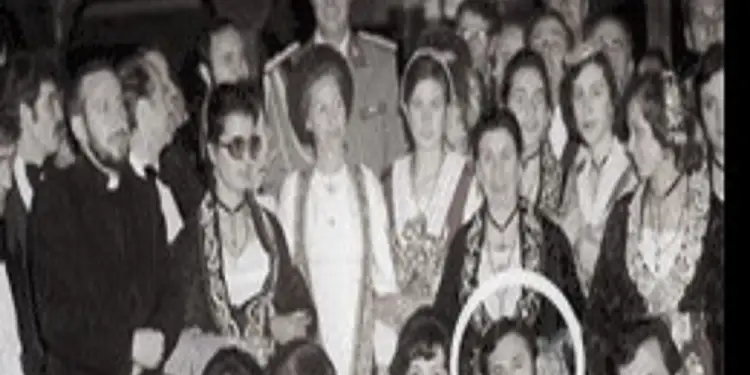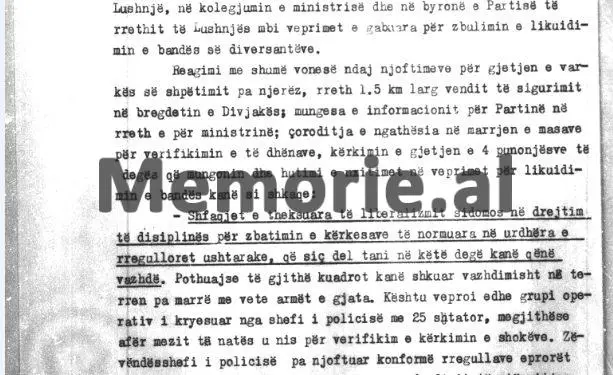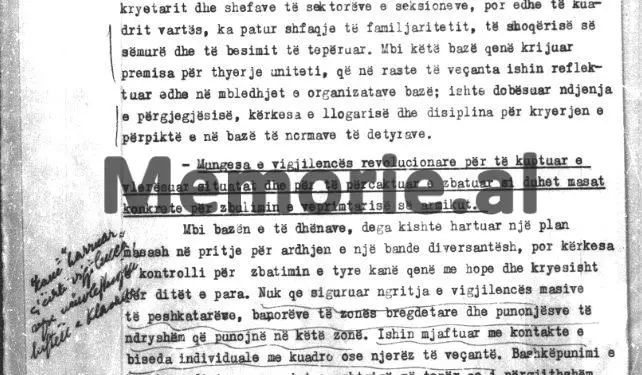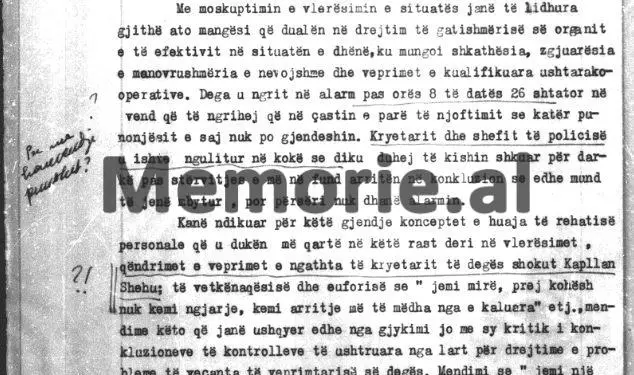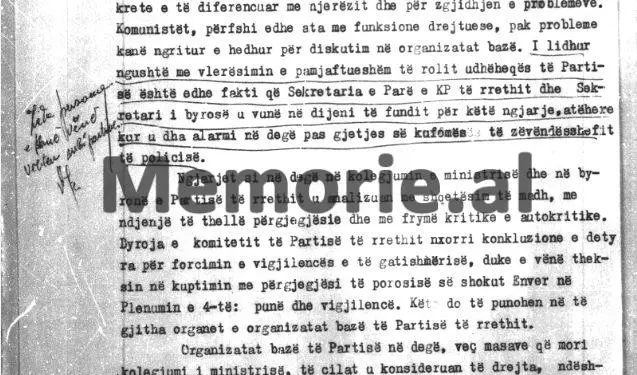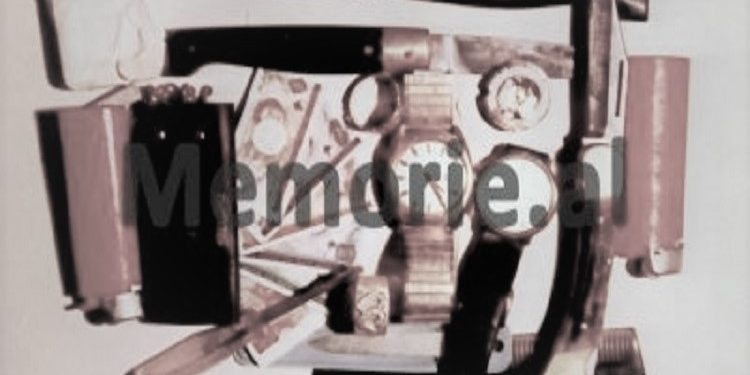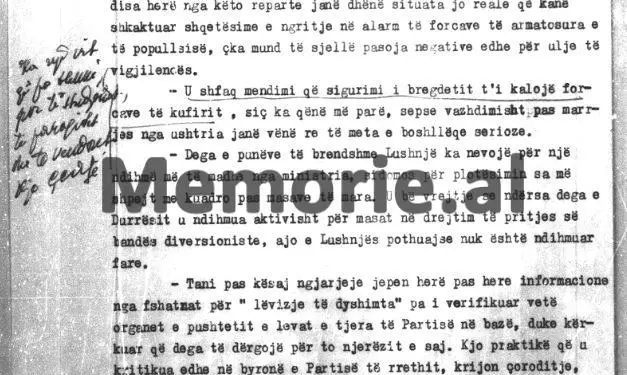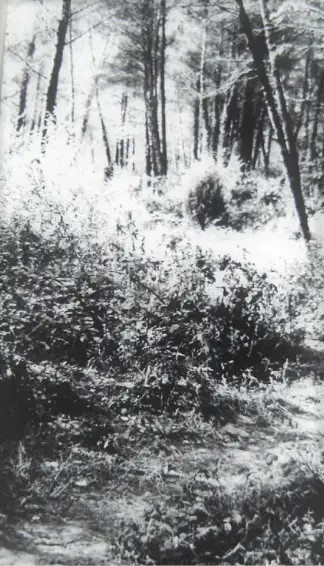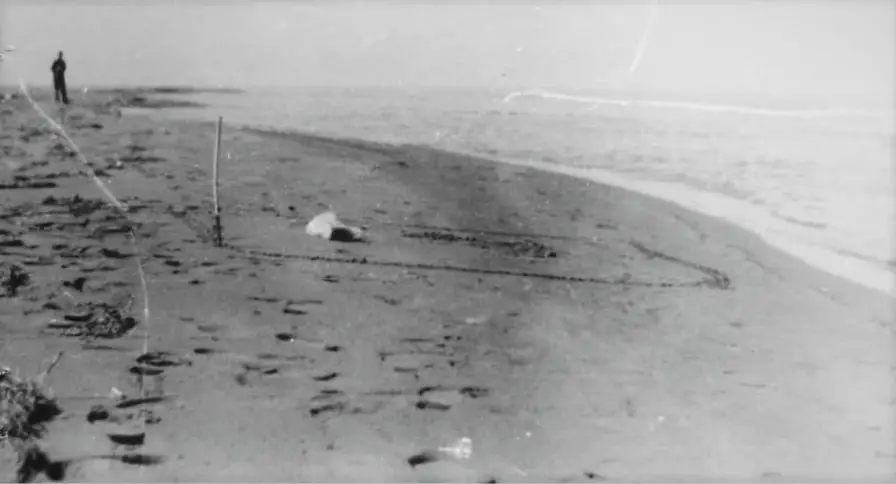Dashnor Kaloçi
The first part
Memorie.al publishes some archival documents issued by the Central State Archive in Tirana (fund of the former Central Committee of the ALP), which belong to the months of October 1982. Among other things, there is a report-information drafted from the group of instructors for the bodies of Internal Affairs, at the office of the Central Committee of the ALP, on the topic: “On some problems that emerged from the analysis of the event of September 25-26 in Lushnje”, which talks about the event of of the so-called “Banda Xhevdet Mustafa”, as well as the minutes of the meeting of the Secretariat of the Central Committee of the ALP, held on October 22 of that year, chaired by the First Secretary of the Central Committee, Enver Hoxha. The whole event of the “landing of the diversionist group” on the coast of Divjaka was analyzed, as well as “the measures that had to be taken, for the protection of possible landing points, on our coast”. Documents with the report-information of the group of instructors for the bodies of Internal Affairs, of the apparatus of the Central Committee of the ALP, where after the analysis made on the landing event of the “Xhevdet Mustafa Gang”, appropriate measures were taken against some of the main leaders of the Internal Affairs Branch of Lushnja district, starting from the chairman Kapllan Shehu, the deputy chairman, Mihal Loli, the Chief of Police, Fane Xhuveli, as well as Ismail Leskaj, who was taken under criminal responsibility. Minutes of the daily meeting of the secretaries of the Central Committee of the ALP, held on October 22 of that year, chaired by Enver Hoxha, attended by Ramiz Alia, Hekuran Isai, Simon Stefani and Rita Marko, who after discussing in detail and analyzing the event with the landing of the “Xhevdet Mustafa Gang”, discussed and laid out the concrete tasks, to enable the protection of the border of the Socialist People’s Republic of Albania, from any possible landing from abroad. It was decided that a contingent with about 600 effectives from the bodies of the Ministry of National Defense, would pass under the Ministry of Internal Affairs, with service for the protection of land and sea border, as well as the approval of a financial amount of about 100 million dollars from the state reserve fund, for the expenses needed to equip the border posts, with the necessary logistics, such as radar, etc.
The secret document with the report-information of the group of instructors for the bodies of Internal Affairs at the apparatus of the Central Committee of the ALP, sent to their superiors, regarding the meeting held in the Branch of Internal Affairs of Lushnja district, where it was taken in analysis the landing event of the “Xhevdet Mustafa Gang”
Fund: CENTRAL COMMITTEE OF THE ALBANIAN LABOR PARTY
(Daily meetings of the secretaries of the Central Committee of the ALP)
– DAILY MEETING OF THE SECRETARIES OF THE CENTRAL COMMITTEE OF THE ALP ON OCTOBER 22, 1982
-FOR MEASURES TO BE TAKEN FOR THE PROTECTION OF POSSIBLE DISCHARGE POINTS ON OUR COAST (QUESTIONS AND DISCUSSION BY COMRADE ENVER HOXHA) (Pg.1)
-FOR INFORMATION (DISCUSSION OF COMRADE ENVER HOXHA) (P.4)
-FOR DEPOSITS OF THE ENEMY FEÇOR SEE AT THE ADDRESS OF KADRI HAZBI
(INFORMATION FROM COMRADE RAMIZ ALIA, SECRETARY OF K.P.
22.10.1982
SECRET
I N F O R M A T I O N
ON SOME PROBLEMS THAT emerged from the ANALYSIS FOR THE EVENT OF SEPTEMBER 25-26 IN LUSHNJE
We followed the analysis made in the Leshnja Branch of Internal Affairs, in the Collegium of the Ministry of Interior, and in the Party Bureau of the Lushnja district, on the wrong actions for the detection and liquidation of the saboteur gang. Delayed response to reports of finding the unmanned lifeboat, about 1.5 km. away from the scene on the coast of Divjaka, lack of information about the Party in the district and the ministry, perversion and clumsiness in taking measures to verify the data, search and find 4 missing Branch employees, and confusion and haste in action for the liquidation of the gang have as reasons:
The pronounced manifestations of liberalism especially in terms of discipline for the implementation of the requirements regulated in military orders and regulations, which as it turns out so far in this Branch have been continuous. Almost all the cadres went to the field without taking their long weapons. So did the operative group led by the Chief of Police on September 25, although near midnight they set out to verify and search for comrades.
The Deputy Chief of Police, without notifying in accordance with the rules the superiors or the operational service of the Branch, after the end of the training with the reserve staff of Divjaka, went together with the police officer of the sector, a policeman, as well as the pilot of the lifeboat (civilian) for lunch and hunting in the fishing tackle, having as a weapon a total of two pistols, and using the motor boat out of the destination (this had become a practice throughout the beach season for Branch staff and other citizens).
Former Police Chief Fane Xhuveli, had ordered the police officers on duty at the beach, not to take and carry long guns in the point because, “the point was a barracks that did not ensure their protection.” The operational service of the Branch did not strictly and discipline implement the requirements set out in the regulations. The controls and remarks made from time to time by the management for these and other shortcomings have been ineffective and in the spirit of omissions (none of the violators was held accountable).
In the report of labor relations, especially between the mayor and the heads of sectors and sections, but also of the subordinate staff, there have been displays of familiarity, sick company, and excessive trust. On this basis, premises were created for breaking the unity that in special cases, were reflected in the meetings of the grassroots organization. The sense of responsibility, accountability, and discipline for the proper performance of norms and duties had been weakened.
Lack of revolutionary vigilance to understand and evaluate situations and to properly define and implement concrete measures to detect enemy activity. On the basis of the database, the Branch had drafted a plan of measures in anticipation of a gang of saboteurs, but the request and control for their implementation have been hopeful and mainly for the first days. Massive vigilance was not provided for fishermen, residents of the coastal area, as well as various employees working in the area. Individual contacts and conversations with special cadres or people were enough.
Cooperation and coordination with army units was rather general, and there was a lack of strict control to prevent the entry into the military area of the coast outside the rules, of persons from different districts of Lushnja, Durres, Fier, who went freely for hunting and other purposes, as well as for strengthening the surveillance and service of the control units. At the meeting of the District Party Bureau, it turned out that people interned in the Bedat sector of the agricultural enterprise, passed without any difficulty through the dajlan to the beach of Divjaka.
There have been cases where they have eaten food and in the fishing canteen. A checkpoint (post-block) that had been set up by the Branch in Çermë by three people who were at the beginning of her shift, had recently been left with one person and the control by the management staff for the actions that had to be carried out there, was very scarce and transient. And it so happened that at the crucial moment the post-bloc could not dictate and neutralize the saboteur who passed there. The lack of understanding of the assessment of the situation is related to all the shortcomings that arose in terms of the readiness of the body and the effective in the given situation, where the necessary skill, intelligence, maneuverability was lacking, as well as qualifying military-operational actions.
The branch raised the alarm after 8 o’clock on September 26, instead of rising from the first moment of notification that its four employees were not found. The Chief of Police and the Chief of Police were reminded that they should have gone to dinner somewhere after the training, and finally came to the conclusion that they may have drowned, but again they were not alarmed. They have influenced this situation and the foreign concepts of personal comfort that became clearer in this case, up to the assessments and clumsy attitudes of the Branch President Comrade Kapllan Shehu, of self-satisfaction and euphoria that: “we are fine, for a long time we have not had events, we have great achievements from the past, etc. “.
These opinions have been nurtured by the non-critical eye of the conclusions of the numerous controls exercised from above, for specific directions and problems of the Branch activity. The thought that we, “are a Branch that operates in depth, not at the border”, has nurtured pacifist illusions of relative calm that have found ground and in the time of the stay of many cadres more in the city than in concrete tasks. Consequently, as many comrades expressed at the party meeting in the Branch, there was political and ideological myopia, the fight against which was insufficient, not drawing the necessary lessons and deep conclusions from the work and analysis of Party directives and messages of Comrade Enver, for assessing situations and strengthening vigilance.
Gaps that still exist for understanding the proper realization of the Party leadership role in the Branch.
In the activity of the basic organizations of the Party in the Branch, the manifestations of bureaucratization, formalism, and formalism have been sensitive. Although analyzes, generalizations, and studies have been made for various problems, their effectiveness has been limited. It turned out that more attention was paid to the official paper work, than to the concrete and differentiated one with people and for problem solving. Communists, including those in leadership positions, have raised few issues regarding discussions in grassroots organizations. Closely related to the insufficient assessment of the leading role of the Party, is the fact that the First Secretary of the District Party Committee and the Secretary of the Bureau, were last informed of this event.
Exactly when the alarm was given in the Branch after finding the body of the Deputy Chief of Police. The events in the Branch, the collegium of the ministry, as well as in the bureau of the District Party, were analyzed with great concern, with a deep sense of responsibility, and with a critical and self-critical spirit. The Bureau of the District Party Committee drew conclusions and tasks to strengthen vigilance and readiness, emphasizing the responsible understanding of Comrade Enver’s message in the 4th Plenum “Work and Vigilance”. These will be worked on in all the basic organs and organizations of the district party.
The basic organizations of the Party in the Branch, in addition to the measures taken by the Collegium of the Ministry, which were considered fair, punished as communists with severe remarks with a note on the registration card, comrades: Kapllan Shehu, Fane Xhuveli, and Ismail Leskaj (this was and in criminal liability, for non-performance of duty) and at the same time Gëzim Muka, with remarks with a note on the registration card. The district party bureau approved these measures, deepening the responsibility of comrade Mihal Loli, as Deputy Chairman of the Branch, and decided to propose to the ministry, to dismiss him from this position, and transfer him to another district, with reduction in liability.
As special problems, the following also emerged: The military units deployed in Divjaka, do not perform the task for this situation, because the observation of the sub-unit point in the fishing dajlan, although the scene is not far away, did not dictate the movement of the gang in a naked place, he did not follow the itinerary of the lifeboat, which departed from there, and did not dictate the saboteurs’ match with the Branch comrades, though this happened in the middle of the day. The control units on September 25-26 had not gone to their assigned destination. After the event, several times from these units, unrealistic situations have been given, which have often been disturbed by the concerns and alarms of the armed forces and the population, which may lead to a decrease in vigilance.
It was thought that the coast guard should be transferred to the Border Forces, as it has been before, because, after receiving it from the army, serious weaknesses and shortcomings have been noticed. The Branch of Internal Affairs in Lushnje, needs more help from the ministry, especially for the staffing as soon as possible, after the measures. It was noted that, while the Durrës Branch was actively assisted with measures to receive the saboteur gang, that of Lushnja was almost not assisted at all. Now after this event, information is given from time to time from the villages for “suspicious movements”, without verifying the authorities themselves and the other levers of the Party at the base.
This causes the Branch to send people to verify them. This practice, which was criticized in the District Party Bureau, creates perversions, difficulties, and deviations from its own duties of the Lushnja Internal Branch. In the basic Security organization, the problem arose that the three comrades of the Party leadership should not have stayed in the place where the saboteur was surrounded, where many people gathered and there were uncontrolled gunfire as, we might be in front of any surprise. But even the Branch did not do its duty to remove them. Memorie.al
Group of instructors
for Internal Affairs Bodies.
2.10.1982
The next issue follows




